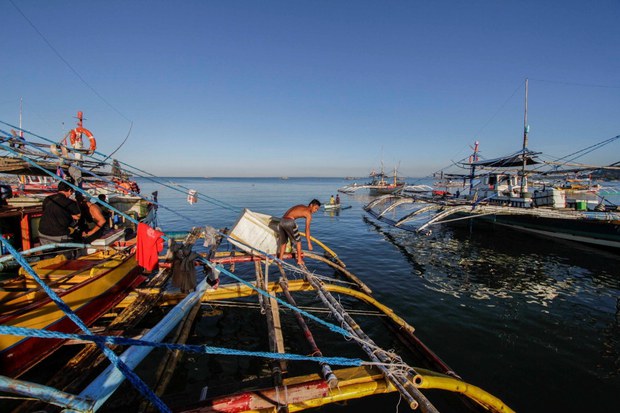Philippines Plays Down Report about Chinese Harassment of Fishermen
2018.06.08
Dagupan and Cotabato, Philippines
 Filipino fishermen prepare their boat for an expedition to the disputed Scarborough Shoal, west of Luzon island, in October 2016.
Filipino fishermen prepare their boat for an expedition to the disputed Scarborough Shoal, west of Luzon island, in October 2016.
The Philippines on Friday downplayed a TV report that showed Chinese coast guard officials allegedly harassing Filipino fishermen near Scarborough Shoal, a chain of reefs and rocks off the country’s western coast that Beijing took by force six years ago.
GMA-7 television aired a video showing the Chinese officials boarding Filipino fishing boats and confiscating their best catch. The station said the incident, which was filmed on a mobile phone, took place May 20.
It quoted one of the fishermen as saying that such incidents happened several times in the past, with the Chinese selecting their best catch before departing.
When asked to comment on the latest incident, presidential spokesman Harry Roque said the government had yet to establish the grounds for a protest, noting that the video he had seen was inconclusive.
“I didn’t actually see any bullying,” Roque said.
However, if the video was authenticated and accurate, the government should file a protest, he said.
But Rep. Gary Alejano, who has been calling for greater government action in the South China Sea, said the video validated intelligence reports about Filipino fishermen being at the mercy of the Chinese.
“This is another evidence to show that what the Duterte administration is saying does not match what is the reality on the ground,” Alejano said. “They are fooling the people.”
In 2012, a Chinese incursion into the area led to an impasse between Beijing and Manila, with China standing its ground and stationing coast guard ships around Scarborough Shoal. The following year, Manila filed an arbitration case against China, arguing the triangular shoal had long been a fishing ground for Filipinos and was well within the country’s exclusive economic zone.
In 2016, the Permanent Court of Arbitration ruled in favor of the Philippines, but China ignored the ruling that was cheered by the rest of the international community.
That same year, President Rodrigo Duterte, who had taken office, welcomed the ruling but did not actively pursue it. Instead, he sought to appease China and make overtures to repair bilateral damage caused by the territorial wrangling.
Alejano said the ruling explicitly stated the shoal was a common fishing ground and the government should be protecting Filipino fishermen.
“The Chinese coast guard is acting much like pirates bypassing small Filipino fishermen and stealing their catch,” Alejano said. “China does not seem to treat us as a sovereign equal anymore.”
He called on the government to protect Filipino fishermen and to “fight for our territory.”
Fernando Hicap, who leads a group of fishermen called Pamalakaya, hit out at Duterte for allegedly acting to protect the interests of China more than Filipino citizens.
“The government has not said anything or filed a diplomatic protest against China for its actions,” Hicap said, adding that Duterte was a disgrace.
Last week, Philippine National Security Adviser Hermogenes Esperon said government had not abandoned the arbitration court ruling but had set it aside in line with Duterte’s police of non-confrontation.
“At the proper time, we will take full advantage of the tribunal ruling, even as China refuses to recognize this, to serve as basis for the country’s exercise of sovereignty and jurisdiction over features that are in the Philippine territorial waters,” Esperon said.
Disputed territory
China claims most of the mineral-rich South China Sea, including areas that reach the shores of its smaller neighbors. The region also is claimed by Brunei, Malaysia, the Philippines, Vietnam and Taiwan, leading to previous armed skirmishes in the area.
Over the past two months, China has ramped up its expansion in the islands it lays claim to and raised international concerns after showing off its deployment of a long-range bomber in an island it occupies. It apparently installed anti-ship cruise missile and surface-to-air missile systems as well as surveillance airplanes in territories in the Spratly islands.
Earlier this week, the Chinese government reacted angrily after the United States Air Force confirmed that two of its B-52 bombers flew near the Spratlys, which China calls the Nansha islands.
“Is it an act of ‘militarization’ to fly offensive strategic weapons like the B-52 bombers to the South China Sea?” Chinese Foreign Ministry spokeswoman Hua Chunying told a press briefing Wednesday, according to an official transcript.
She was alluding to a speech made over the weekend in Singapore by U.S. Defense Secretary James Mattis, who warned about China’s militarization of the sea region.
“[S]top playing up the so-called ‘militarization’ in the South China Sea and stop talking through their hat,” Hua said, referring to the American side.
“China will never be intimidated by some military vessels or planes, the presence of which will only strengthen our resolve to take all necessary measures to safeguard our national sovereignty and security and uphold peace and stability in the South China Sea,” she added.







